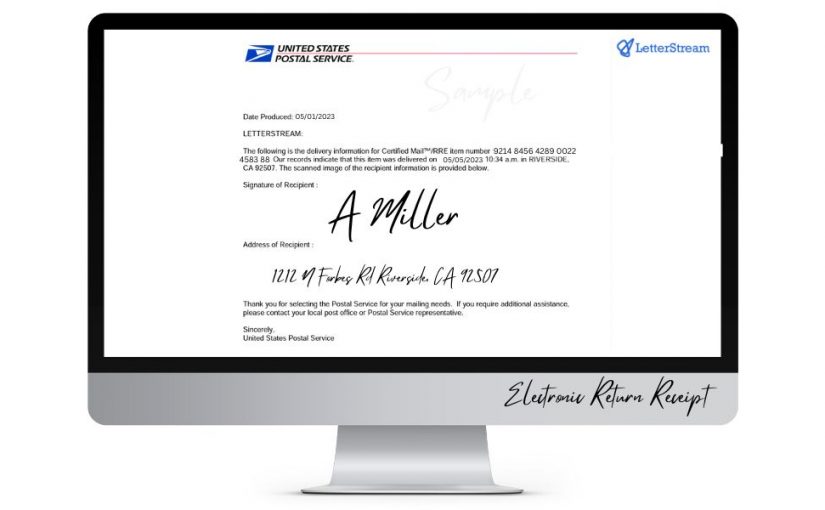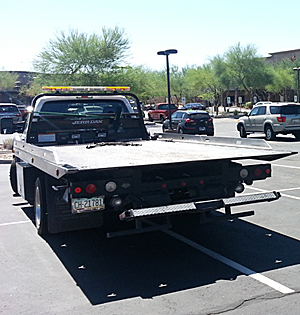What is the difference between a Return Receipt and Electronic Return Receipt (ERR)?
Actually, let’s get more specific, shall we? What are the different types of Return Receipt for Certified Mail?
There are two different ways to get a Return Receipt through the United States Postal Service (USPS) for your Certified Mail. The first is the traditional green card, also known as PS Form 3811, which the Postal Service calls a Return Receipt.
The second method is an Electronic Return Receipt (ERR). No special forms are needed to purchase or take advantage of with ERR. An Electonic Return Receipt, simply put, is an electronic version of a Return Receipt.
Do I Need a Return Receipt?
Let’s back up just a bit and point out that you may not even need a Return Receipt for your Certified Letter. A simple Certified Letter without a Return Receipt will provide tracking on USPS.com or various other websites that have access to USPS tracking data, like LetterStream.com and www.OnlineCertifiedMail.com. So, if you just want to know the status of your letter, you may not need to spring for the additional expense of a Return Receipt.
The Return Receipt, however, does give you the added information of the name and signature of the person who received your letter. This provides you with a little extra information and might help you prove that someone actually saw your letter and took it into their hands.
Return Receipt Vs Electronic Return Receipt
So, back to the differences between Return Receipts. A Return Receipt, also known as a green card, is a green pre-printed postcard that you can pick up at your local post office and apply to the back of the Certified letter you are about to mail.
You will need to add your address to the green card or the address where you’d like the green card sent after the letter gets signed for. You’ll also want to put the tracking number from the Certified Mail barcode label (PS Form 3800) on the green card as well so you will know specifically which letter the green card relates to.
After paying the extra fees for Return Receipt and attaching the form to your letter, you are ready to give the letter to the USPS and let them do their part. When they deliver your Certified letter with Return Receipt included, they will have the person who gets your letter sign the green card.
The postal carrier will then take the green card back to the USPS and put it in the mail so it will be returned to the sender. If all goes well, you’ll have your green card back in no time (or maybe longer, just depends).
The process gets a bit simpler with Electronic Return Receipt. You simply tell the USPS cashier that you’d like to send your Certified Letter with ERR. No extra forms are required, but there is a charge for this service. The cashier will scan the Certified Mail barcode (PS Form 3800) that you’ve placed on your letter. This tracking number will appear on your USPS receipt along with the fees for Electronic Return Receipt. You will then be able to use this tracking number to check the status of your Certified letter.
Collecting a Signature
When the mail carrier delivers your Certified letter, they will collect a signature either on the green card or on their digital tracking pad. When they get back to their office, they will either scan it into their computer system or they will download the signatures from their digital tracking pad.
Once the signature is in their computer system, they will create an electronic document/letter providing details of the delivery. It will show the date the letter was delivered and include the signature of the person who received the letter. If you choose to send it as a Return Receipt, the green card will get mailed back to you. If Electronic Return Receipt is choosen, this document will not be mailed to you; however, you can go to USPS.com, enter the 20-digit tracking number from your receipt and request the signature via email when it is available.
If you choose to mail you Certified letter, either through LetterStream or OnlineCertifiedMail.com then you can access a copy of the Electronic Return Receipt right in your online portal.
Is There a Difference Legally?
Some people want to know if there is a difference in the legal authority of a green card compared to an ERR. Long ago the USPS claimed on their website that there was no legal difference, however, they soon discovered that they are not the judge of that. Instead, the ultimate authority belongs to the local judge who gets to determine whether they are the same or not.
From our experience, the Electronic Return Receipt is accepted by most judges. We haven’t heard even a rumor of a judge tossing out the ERR as valid proof of delivery. If in doubt, we suggest that you contact the local authorities and see if they can confirm that an ERR is just as binding as a green card.
To sum it up, Return Receipt and Electonic Return Receipt both provide the same value when it comes to the added information of the name and signature of the person receiving your Certificated letter. One actually just is a bit more convenient than the other.



